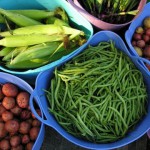- Rooted in the community: The nonprofit garden helps locals living with food insecurity. Courtesy of The Lord’s Acre
A little girl's handwritten description of her weekly visits to the food pantry with her mother underscores how community gardens can help feed the hungry in Western North Carolina.
"She wrote: 'I really like going to the pantry, because I get to help my mom pick out the vegetables. I like picking out tomatoes,' and she drew a big smiley face next to it," recalls Cherie Becker, the director of Food for Fairview. The girl then wrote, "'It makes me sad when there are no cucumbers,' and she drew a little sad face. It was really telling."
The note was part of a MANNA FoodBank fundraising event that asked clients to record their experiences with food assistance. For Becker, this child's story illustrates the value of fresh produce, something many of us take for granted. Food for Fairview typically serves 65 to 70 people each week.
Recent reports from the Food Research and Action Center rated the Asheville metropolitan area the third-worst in the country in terms of food hardship last year. In 2010, the area ranked seventh-worst. And as food-insecurity rates increase, gardening can help, notes Amy Lanou, associate professor of health and wellness at UNCA.
"One thing we can do is grow our own food in our windowsills or gardens," she explains. "If we're growing more than we need, we can give some away. It would take some pressure off the food system."
Community gardens take the idea a step further, recruiting local volunteers to help maintain a central garden and then giving away a portion of what’s grown. The Lord's Acre, a nearby half-acre garden, donates most of its produce to Food for Fairview as a way to build community.
"Every Friday morning they harvest their garden and bring us barrels of produce during the summertime," says Becker. "Then our pantry clients not only have the canned food to choose from: They have a lot of fresh things."
Unlike many such programs, Food for Fairview lets its clients shop for themselves rather than picking up pre-packed boxes. Volunteers walk them through the aisles, letting them select a specified number of items from each shelf, depending on their family’s size.
For many clients, fresh produce is a welcome break from the standard dried rice and canned goods. "They love it: Part of it is the health aspect, but a lot of it is that it is different," Becker reports.
Some people, however, find unfamiliar foods intimidating. "Last year, the clients would see stuff like kale, and if they didn't know what it was, they were kind of reluctant to take it," she recalls. To ease that uncertainty, Becker wants to do more to inform clients about the available items.
"I'd like to get a list of some of these frequent vegetables [The Lord's Acre] will be donating every Friday," she explains. "If it's something unusual, I'd like to make a recipe card or something to make them more willing to take it and try it.” Overall, stresses Becker, clients are very receptive.
The Lord's Acre also emphasizes education as key to reducing local food insecurity, says Susan Sides, the nonprofit’s garden manager. She does regular presentations on various new gardening techniques.
"We've had so many people say to us, 'Because I can see it, it made me feel I can do it,'" she reports. "I have so many people point to the straw bale and say, ‘There is no reason in the world I can't do that.'"
Sides and her group’s 14-member board of directors get their hands dirty right alongside the interns and other volunteers.
"I tell the interns, 'The biggest thing that’s going to impact you is not the garden: It's the community,'" Sides reveals. "They all just say, 'At least I know it exists.' It's like finding the perfect marriage and saying, 'At least I know it’s possible people can come together and have a good time.'"
Community gardening, she notes, also enables people from differing socio-economic backgrounds to share their talents.
"It's a way of letting people use their gifts and break down barriers," Sides explains. "Maybe someone who makes $5,000 a year knows how to can, and someone who makes $60,000 a year doesn't. There is some empowerment there. It's not about what we have but what we come together to do with each other."
The Lord's Acre is far from the only such local project. The Dr. John Wilson Community Garden in Black Mountain, for example, donates more than 4,000 pounds of vegetables to area food pantries and kitchens. Others follow different models (see box, “Get Growing”).
"For me, the vision is really at a deep level: It's making it OK for neighbor to connect with neighbor," says Sides. "It's not going to be a program you outline from A to Z. It's dynamic, it's organic, it's messy — and it works."
— Megan Dombroski is a senior journalism student at UNCA.



Before you comment
The comments section is here to provide a platform for civil dialogue on the issues we face together as a local community. Xpress is committed to offering this platform for all voices, but when the tone of the discussion gets nasty or strays off topic, we believe many people choose not to participate. Xpress editors are determined to moderate comments to ensure a constructive interchange is maintained. All comments judged not to be in keeping with the spirit of civil discourse will be removed and repeat violators will be banned. See here for our terms of service. Thank you for being part of this effort to promote respectful discussion.